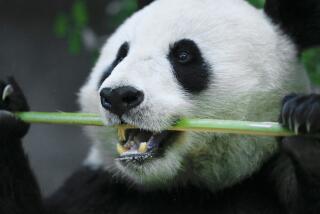Coronado Couple’s Gift Will Help Zoo Research
- Share via
A wealthy Coronado couple will deed their $3-million home to the San Diego Zoological Society, and proceeds of the house’s sale will help finance a new building for the zoo’s reproductive research team, zoo officials said Friday.
Paul Harter, 72, and his wife Ione, 71, will sign over their house in January but retain the right to stay there as long as either is living, said zoo spokesman Jeff Jouett.
Last year, the real estate investor and his wife pledged $1.75 million in municipal bonds to the zoo, also payable upon their demise. The two gifts combined make the childless pair the Zoological Society’s largest benefactors in its 72-year history, Jouett said.
A Lifelong Interest in Animals, Children
“The Harters have had a lifelong interest in animals and children, and this gift is a natural extension of their personal interest. I think they were introduced to the people who work at the center after their first donation, and they have become involved in the goals of the center as a way to contribute to future generations,” Jouett said.
The Center for Reproduction of Endangered Species, which employs nine scientists and 18 technicians and other support staff members, is situated in a 1927 building behind the Old Globe Theatre that is “bursting out of its seams,” said Werner Heuschele, director of research at the center.
The building served as a veterinary hospital until the 1977 opening of the adjacent Jennings Center for Veterinary Medicine. The reproductive research center was founded in 1975.
“We are in the initial stages of designing a new headquarters, and the $3 million will give us a good start. We want $5 million to $6 million because we want to bring in some new, high-tech equipment,” Heuschele said.
Heuschele said the center is the largest and broadest institution of its kind in the world. Recent and continuing projects include:
- Genetic DNA “fingerprinting” to determine how closely certain condors are related, so that the least related birds can be mated without fear of inbreeding.
- A cheetah breeding program at the Wild Animal Park credited with 72 births since 1971.
- Three successful births of the highly endangered Chinese monal pheasant after artificial insemination.
- A study of female reproductive cycles in a variety of species through hormonal analysis of urine, with a view toward identifying the best mating times.
The center’s goal is “to make captive endangered species self-sustaining” through reproduction in hopes of reintroducing them to the wild, Heuschele said.
The new center building, which officials hope to start constructing within five years, will bear the Harter name. The zoo’s trustees have also voted to rename the Children’s Zoo, a beneficiary of the couple’s first gift, the Ione and Paul Harter Children’s Zoo, Jouett said.
More to Read
Sign up for Essential California
The most important California stories and recommendations in your inbox every morning.
You may occasionally receive promotional content from the Los Angeles Times.













